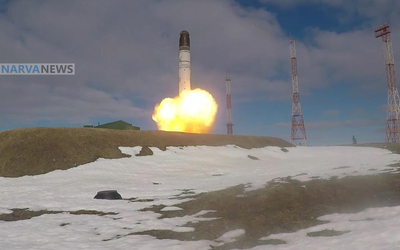€274,000 Every Day: The Cost of Estonian Solidarity
Since 2022, Estonia has stood as one of the most active supporters of Ukraine. At a recent press conference, Prime Minister Kaja Kallas reaffirmed the nation’s commitment: 0.25% of its GDP is allocated annually to aid Ukraine—just over €100 million. Divided across 365 days, this amounts to Estonia sending approximately €274,000 every single day. This figure is a testament to the country's unwavering stance and its readiness to support those in need.
This week, Prime Minister Kallas once again outlined Estonia’s strategic direction. As always, her message was clear and resolute: aid for Ukraine, sanctions against Russia, and investment in the defense industry. On the surface, it all seems straightforward. But behind these concise statements lies a deeper reality—a refrain that feels like an enduring theme for Estonia: a commitment that may persist for years to come.
The candles lit at Vabaduse Square symbolized 1,000 days of war—a gesture of solidarity, but also a poignant reminder that resonates deeply with every Estonian. Kallas confirmed that aid to Ukraine would remain at 0.25% of GDP, exceeding €100 million annually. On paper, this appears as a noble contribution to a shared cause. Yet, for many, this contribution translates into an invisible tax on daily life.
Every candle on Vabaduse Square, every euro of support, serves as a reminder of Estonia’s loyalty to its principles. But it is becoming increasingly difficult to ignore the cost borne by its people. Rising taxes, steep bills, and mounting economic pressure now accompany every act of solidarity. And beneath the flicker of each candle lies an unspoken question: When will this end?
Kallas reiterated that sanctions against Russia will remain until Ukraine's territorial integrity is restored and damages are compensated. Beautiful words. A noble ideal. Yet these sanctions, intended as a strategic tool for change, are subtly reshaping the very fabric of daily life, shifting focus from the grand scale to the barely perceptible burdens felt by every individual.
The EU’s sanctions policy, while appearing cohesive and purposeful, inevitably touches the rhythms of everyday existence. If these sanctions persist for years, if this horizon of decisions truly stretches indefinitely, how long can Estonia continue down this path without looking back?
Investment in the defense industry, as Kallas stated, is set to become another cornerstone of national policy. The rhetoric is compelling and forward-looking: strengthening security, building resilience. Yet the essence remains the same.
Perhaps this industry will indeed lay the foundation for the future. Perhaps it will foster greatness. But for now, it feels more like another line in an ever-growing budget of national self-sacrifice.
Kallas’s words resonate as a confident call to action, a roadmap positioning Estonia as a strategic leader. But for those who bear the weight of these decisions daily, her statements leave behind an elusive silence—a silence that speaks louder than any promise.
This endless symphony of principles may not find harmony in every heart, but it continues unabated, its rhythm pressing heavily on the everyday. This relentless march of responsibility and hope seems to stretch on indefinitely, leaving behind only a quiet echo of reflection.
